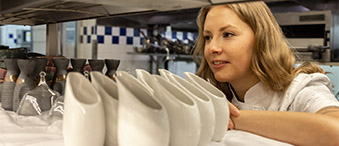Could cancer biotherapeutics be the next revolution in cancer treatment?
From helping the body’s own immune system better detect and fight cancer, to treating cancer with genetically-enhanced immune cells, viruses and vaccines, The Ottawa Hospital is conducting cutting-edge research that could transform cancer care right here at home and around the world.
For decades, scientists have tried to stimulate the immune system to attack cancer cells. A breakthrough came through the discovery that cancer cells make key molecules that suppress immune cells and prevent them from attacking the cancer. This discovery opened the door to revolutionary immunotherapy drugs called checkpoint inhibitors, which have shown striking results in recent years.
While promising research on checkpoint inhibitors continues, the race is now on to bring an innovative new kind of immunotherapy to patients – one that uses living cells, viruses and genes to fight cancer.
The Ottawa Hospital is a world leader in developing these innovative therapies, called cancer biotherapeutics.
“Our immune system is constantly trying to recognize and kill cancer cells, but the cancer cells are always trying to hide from it.”
— Dr. John Bell
Helping the body recognize and destroy cancer
CAR T-cell therapy is an emerging biotherapeutic treatment that harnesses the power of a patient’s own immune cells, known as T-cells, to treat their cancer. T-cells play a critical role in the immune system by killing abnormal cells, such as cells infected by germs or cancer cells. In some cancers, like acute lymphoblastic leukemia (ALL), cancerous cells become invisible to the T-cells that are meant to kill them. In CAR-T therapy the T-cells are collected and reprogrammed in the lab to recognize and destroy the cancerous cells.
“This type of immunotherapy research is groundbreaking,” said Dr. Natasha Kekre, a hematologist and associate scientist at The Ottawa Hospital, “but it is important to remember that CAR-T therapy is still very new and there can be serious side effects. We need more research to learn about this therapy and make it work for even more people and more kinds of cancer.”
The Ottawa Hospital is one of the first hospitals in Canada to participate in internationally-led CAR-T trials, and as one of Canada’s top research and treatment centres, the hospital is ideally positioned to play a lead role in bringing an innovative CAR-T research program to Canada, and to Canadian patients.
“Our goal is to build Canadian expertise and capacity for innovation in the promising CAR-T field through both laboratory research and clinical trials,” said Dr. Kekre, who is working with a team across the country. “This could lead to better CAR-T therapies that work for more kinds of cancer, as well as innovative approaches for providing CAR-T therapy in the Canadian system.”
Infecting cancer cells with viruses
Another promising biotherapeutic treatment uses oncolytic viruses that selectively infect and kill cancer cells. “Our immune system is constantly trying to recognize and kill cancer cells, but the cancer cells are always trying to hide from it,” explained Dr. John Bell, senior scientist at The Ottawa Hospital. “When you infect a cancer cell with a virus, it raises a big red flag, which helps the immune system recognize and attack the cancer.”
Recent laboratory research from Dr. Bell’s team suggests that a combination of two immunotherapies, oncolytic viruses and checkpoint inhibitors, could be much more successful in treating breast cancer and possibly other cancers.
“We found that when you add a checkpoint inhibitor after the virus, this releases all the alarms and the immune system sends in the full army against the cancer,” said Dr. Bell.
Though these methods have shown promising results, more research and clinical trials are needed.
Cancer-fighting vaccine
In addition to these techniques The Ottawa Hospital’s Dr. Rebecca Auer has found that a cell vaccine, developed in the lab using an individual’s cancer cells combined with a cancer-fighting virus, could be effective in battling cancer. Once injected, this vaccine uses a triple-threat to attack the cancer.

First, the virus only infects and kills cancer cells, leaving healthy cells unscathed. Second, the virus produces a protein called interleukin-12, which boosts the immune system’s natural ability to fight the tumour. Third, as a result, the vaccine trains the immune system to recognize and fight off the same kind of tumour if it ever comes back.
Dr. Auer and her colleagues are developing the processes required to manufacture this personalized cell vaccine and plan to initiate a “first in human” clinical trial in 2020.
Lifesaving therapies: from idea to bedside
Today, cancer care is changing at an unprecedented pace. Many patients who, only a few years ago, had few to no treatment options are now being offered hope with treatments that are more targeted and personalized. We are seeing approvals for new cancer drugs grow at an almost exponential rate, while world-class research and clinical trials are being integrated into cutting-edge cancer care.
Over the next 15 years, Canadians will see a 40 percent increase in cancer diagnoses with almost one in two developing cancer in their lifetime. Our ability to translate research into patient therapies coupled with one of the best-equipped cancer centres in the country means we are well-positioned to face this challenge head-on.
The Ottawa Hospital is a leading academic health, research, and learning hospital proudly affiliated with the University of Ottawa.




